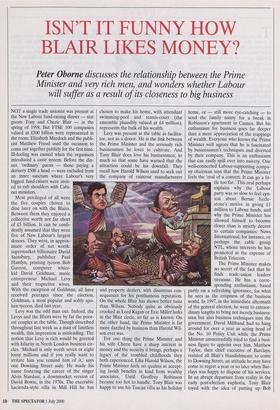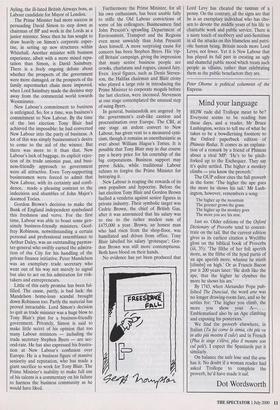ISN'T IT FUNNY HOW BLAIR LIKES MONEY?
Peter Oborne discusses the relationship between the Prime
Minister and very rich men, and wonders whether Labour will suffer as a result of its closeness to big business
NOT a single trade unionist was present at the New Labour fund-raising dinner — star guests Tony and Cherie Blair — in the spring of 1998. But FTSE 100 companies valued at £500 billion were represented in the room. Elizabeth Murdoch and the publi- cist Matthew Freud used the occasion to come out together publicly for the first time. Ill-feeling was caused when the organisers introduced a caste system. Before the din- ner, 'ordinary' guests — those paying a derisory £500 a head — were excluded from an inner sanctum where Labour's very biggest fund-raisers were invit- ed to rub shoulders with Cabi- net ministers.
Most privileged of all were the five couples chosen to dine later on with the Blairs. Between them they enjoyed a collective worth not far short of £5 billion. It can be confi- dently assumed that they were five of New Labour's largest donors. They were, in approx- imate order of net worth: supermarket billionaire David Sainsbury, publisher Paul Hamlyn, printing tycoon Bob Gavron, computer whizz- kid David Goldman, music entrepreneur Michael Levy and their respective wives. With the exception of Goldman, all have received peerages since the election. Goldman, a most popular and softly spo- ken tycoon, died last year.
Levy was the odd man out. Indeed, the Levys and the Blairs were by far the poor- est couples at the table. Though described throughout last week as a man of limitless wealth, this impression is misleading. The notion that Levy is rich would be greeted with hilarity in North London business cir- cles. 'Michael is only worth seven or eight lousy millions and if you really want to irritate him you remind him of it,' says one Downing. Street aide. He made his name fostering the career of the singer Alvin Stardust, a downmarket version of David Bowie, in the 1970s. The execrable hacienda-style villa in Mill Hill he has chosen to make his home, with attendant swimming-pool and tennis-court (the ensemble plausibly valued at £4 million), represents the bulk of his wealth.
Levy was present at the table as facilita- tor, not as a donor. He is the link between the Prime Minister and the seriously rich businessmen he loves to cultivate. And Tony Blair does love his businessmen; so much so that some have warned that the attraction could be his downfall. They recall how Harold Wilson used to seek out the company of raincoat manufacturers and property dealers, with disastrous con- sequences for his posthumous reputation. On the whole Blair has shown better taste than Wilson. Nobody quite as obviously crooked as Lord Kagan or Eric Miller lurks in the Blair circle, so far as is known. On the other hand, the Prime Minister is far more dazzled by business than Harold Wil- son ever was.
For one thing the Prime Minister and his wife Cherie have a sharp interest in money and the security it brings, perhaps a legacy of the troubled childhoods they both experienced. Like Harold Wilson, the Prime Minister feels no qualms at accept- ing lavish benefits in kind from wealthy associates. Until Geoffrey Robinson became too hot to handle, Tony Blair was happy to use his Tuscan villa as his holiday The Prime Minister makes no secret of the fact that he finds trade-union leaders tiresome. He has a corre- sponding enthusiasm, based partly on a refreshing ignorance, for what he sees as the crispness of the business world. In 1997, in the immediate aftermath of the general election, he went to extraor- dinary lengths to bring not merely business- men but also business techniques into the government. David Miliband had to hang around for over a year as acting head of the No. 10 Policy Unit while the Prime Minister unsuccessfully tried to find a busi- ness figure to appoint over him. Matthew Taylor, then chief executive of Barclays, resisted all Blair's blandishments to come to Downing Street, an attitude he may have come to regret a year or so later when Bar- clays was happy to dispose of his services. In an abrupt departure from reality in the early post-election euphoria, Tony Blair toyed with the idea of putting up Bob Ayling, the ill-fated British Airways boss, as Labour candidate for Mayor of London.
The Prime Minister had more success in persuading David Simon to step down as chairman of BP and work in the Lords as a junior minister. Since then he has sought to draw heavily on Simon's corporate exper- tise, in setting up new structures within Whitehall Another minister with business experience, albeit with a more mixed repu- tation than Simon, is David Sainsbury. There is a lively ongoing debate about whether the prospects of the government were more damaged, or the prospects of the family supermarket chain more improved, when Lord Sainsbury made the decisive step away from the commercial world towards Westminster.
New Labour's commitment to business is unfeigned. So, for a time, was business's commitment to New Labour. By the time of the last election Tony Blair had achieved the impossible: he had converted New Labour into the party of business. A lot of this was simply businessmen's desire to come to the aid of the winner. But there was more to it than that. New Labour's lack of baggage, its explicit rejec- tion of its trade unionist past, and busi- ness-friendly approach to government were all attractive. Even Tory-supporting businessmen were forced to admit that New Labour, with its certainty and confi- dence, made a pleasing contrast to the indecision and shambles of John Major's doomed Tories.
Gordon Brown's decision to make the Bank of England independent symbolised this freshness and verve. For the first time, Labour was able to boast some gen- uinely business-friendly ministers. Geof- frey Robinson, notwithstanding a certain personal and professional resemblance to Arthur Daley, was an outstanding paymas- ter-general who swiftly earned the admira- tion of the City for his handling of the private finance initiative. Peter Mandelson was an exemplary trade secretary who went out of his way not merely to signal but also to act on his admiration for risk- takers and entrepreneurs.
Little of this early promise has been ful- filled. The cause, partly, is bad luck: the Mandelson home-loan scandal brought down Robinson too. Partly the material has proved intractable. Lord Simon's decision to quit as trade minister was a huge blow to Tony Blair's plan for a business-friendly government. Privately, Simon is said to make little secret of his opinion that too many Labour ministers — including the trade secretary Stephen Byers — are sec- ond-rate. He has also expressed his frustra- tion at New Labour's confusion over Europe. He is a business figure of massive seniority and reputation, who has made a giant sacrifice to work for Tony Blair. The Prime Minister's inability to make full use of his talents is a commentary on his failure to harness the business community as he would have liked. Furthermore the Prime Minister, for all his own enthusiasm, has been unable fully to stifle the Old Labour convictions of some of his colleagues. Businessmen find John Prescott's sprawling Department of Environment, Transport and the Regions even more unwieldy than John Prescott does himself. A more surprising cause for concern has been Stephen Byers. His 'rip- off Britain' campaign, giving the impression that many senior business people are crooks, charlatans and rogues, caused fury. Even loyal figures, such as Denis Steven- son, the Halifax chairman and Blair crony who played a large role in introducing the Prime Minister to corporate moguls before the last election, were incensed. Stevenson at one stage contemplated the unusual step of suing Byers.
In general, businessfolk are angered by the government's crab-like caution and procrastination over Europe. The CBI, at one stage an ardent convert to New Labour, has given vent to a measured cyni- cism, though it remains as unenthusiastic as ever about William Hague's Tories. It is possible that Tony Blair may in due course pay a heavy price for his courtship of the big corporations. Business support may prove fickle, while traditional Labour refuses to forgive the Prime Minister for betraying it.
New Labour is reaping the rewards of its own populism and hypocrisy. Before the last election Tony Blair and Gordon Brown fuelled a vendetta against senior figures in private industry. Their symbolic target was Cedric Brown, the chief of British Gas, after it was announced that his salary was to rise to the rather modest sum of £475,000 a year. Brown, an honest man who had risen from the shop-floor, was humiliated and driven from office. Tony Blair labelled his salary `grotesque'; Gor- don Brown was still more contemptuous. Both have blood on their hands.
No evidence has yet been produced that Lord Levy has cheated the taxman of a penny. On the contrary, all the signs are that he is an exemplary individual who has cho- sen to devote the middle years of his life to charitable work and public service. There is a nasty touch of snobbery and anti-Semitism in all the attacks on this blameless and patri- otic human being. Britain needs more Lord Levys, not fewer. Yet it is New Labour that has played its full part in creating an ugly and shameful public mood which treats such people as villains, rather than celebrating them as the public benefactors they are.
Peter Oborne is political columnist of the Express.



























































 Previous page
Previous page